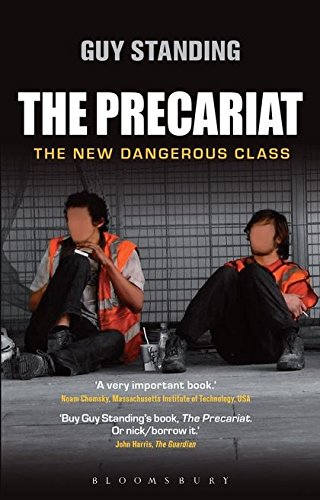Guy Standing: The Precariat: The New Dangerous Class (2011–) [EN, PL, BR-PT, FR, CN]
Filed under book | Tags: · basic income, labour, migration, neoliberalism, politics, populism, precariat, social democracy, work

“Neo-liberal policies and institutional changes have produced a huge and growing number of people with sufficiently common experiences to be called an emerging class. In this book Guy Standing introduces what he calls the Precariat – a growing number of people across the world living and working precariously, usually in a series of short-term jobs, without recourse to stable occupational identities or careers, stable social protection or protective regulations relevant to them. They include migrants, but also locals.
Standing argues that this class of people could produce new instabilities in society. They are increasingly frustrated and dangerous because they have no voice, and hence they are vulnerable to the siren calls of extreme political parties. He outlines a new kind of good society, with more people actively involved in civil society and the precariat re-engaged. He goes on to consider one way to a new better society — an unconditional basic income for everyone, contributed by the state, which could be topped up through earned incomes.
This is a topical, and a radical book, which will appeal to a broad market concerned by the increasing problems of labour insecurity and civic disengagement.”
Publisher Bloomsbury Academic, London, 2011
ISBN 1849663513, 9781849663519
Creative Commons BY-NC Licence
ix+198 pages
Essay by the author (The Guardian, June 2011)
Excerpts from a seminar with the author (video, United Nations, September 2011)
Interview with the author (James Foley, International Socialist, November 2011)
Essay by the author (OpenDemocracy.net, January 2012)
Reviews: Keith Randle (Work Organisation, Labour & Globalisation, 2011), Gaverne Bennett (Socialist Review, 2011), Arne L Kalleberg & Hazel Conley & David A Spencer (Work, Employment and Society, 2012; Response), Xavier St-Denis (Canadian Rev of Sociology, 2012), Geoff Bailey (International Socialist Review, 2012), Jan Breman (New Left Review, 2013; Response), Catherine Lawlor (Global Discourse, 2013), Chris Deeming (J Social Policy, 2013), Andreas Bieler (Capital & Class, 2013), Kieran Allen (Irish Marxist Review, 2014), Monica Threlfall (E-International Relations, 2015), Dylan Taylor (POA Review, n.d.), Bengt Furåker (Arbetsmarknad & Arbetsli, 2014, SW), Edgar Augusto Valero Julio (Rev Colombiana de Sociologia, 2015, ES), Lech Mikulski (Państwo i Społeczeństwo, 2015, PL), Jean-Pierre Durand (Nouvelle Revue du Travail, 2017, FR), Anne Rodier (Le Monde, 2017, FR).
The Precariat: The New Dangerous Class (English, 2011, updated on 2018-12-29; EPUB)
O Precariado: A nova classe perigosa (BR-Portuguese, trans. Cristina Antunes, rev. Rogério Bettoni, 2013)
Prekariat: nowa niebezpieczna klasa (Polish, trans. Paweł Kaczmarski and Mateusz Karolak, 2014, Introduction & Chapters 1-3, HTML, PDFs, updated on 2021-1-18)
Le précariat: les dangers d’une nouvelle classe (French, trans. Mickey Gaboriaud, 2017, added on 2020-1-18)
Bu wen ding wu chan jie ji (Chinese, trans. Weiren Liu, 2019, added on 2020-1-18)
See also Standing’s A Precariat Charter: From Denizens to Citizens (2014, EPUB, added on 2018-12-29).
Comment (0)Chantal Mouffe: The Democratic Paradox (2000–) [EN, ES, PL]
Filed under book | Tags: · agonism, agonistic pluralism, antagonism, deliberative democracy, democracy, ethics, neoliberalism, philosophy, pluralism, politics, social democracy

“A new understanding of democracy that acknowledges the inescapable and essential antagonism in its workings.
From the theory of ‘deliberative democracy’ to the politics of the ‘third way’, the present Zeitgeist is characterized by attempts to deny what Chantal Mouffe contends is the inherently conflictual nature of democratic politics. Far from being signs of progress, such ideas constitute a serious threat to democratic institutions. Taking issue with John Rawls and Jürgen Habermas on one side, and the political tenets of Blair, Clinton and Schröder on the other, Mouffe brings to the fore the paradoxical nature of modern liberal democracy in which the category of the ‘adversary’ plays a central role. She draws on the work of Wittgenstein, Derrida, and the provocative theses of Carl Schmitt, to propose a new understanding of democracy which acknowledges the ineradicability of antagonism in its workings.”
Publisher Verso, London, 2000
ISBN 1859842798, 9781859842799
143 pages
The Democratic Paradox (English, updated on 2017-10-16)
La paradoja democrática (Spanish, trans. Tomás Fernández Aúz and Beatriz Eguibar, 2003, added on 2020-10-23)
Paradoks demokracji (Polish, trans. Wojciech Jach, Magdalena Kamińska, and Andrzej Orzechowski, 2005, added on 2020-10-23)
Robert Hassan: Empires of Speed. Time and the Acceleration of Politics and Society (2009)
Filed under book | Tags: · blogging, cyberculture, democracy, network society, politics, postmodern, social democracy, speed, time

The beginning of the 21st century is witnessing the emergence of a social, political and technological revolution in networked computing. We now live in a networked society, but it functions and develops at such an accelerating rate that it becomes increasingly difficult to adequately understand the nature of this radical society. Empires of Speed is the first book to analyse the far-reaching transformations of speed-filled everyday life. In a compelling study Hassan shows that we are leaving behind a modern world based upon the time of the clock, and are entering a new and volatile phase where an accelerating ‘network time’ poses fundamental economic and political challenges in our postmodern world, challenges we barely comprehend and are thus woefully unprepared for.
Publisher BRILL, 2009
Volume 4 of Supplements to The study of time
ISBN 9004175903, 9789004175907
Length 254 pages

